Benedict XVI
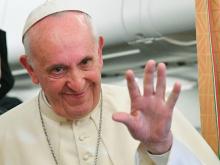
Pope Francis leaves on Monday, Oct. 31 for an overnight trip to Sweden, a historically Protestant country that today is one of the most secular in the world.
The visit is to mark the start of observances of next year’s 500th anniversary of the Reformation, which traditionally dates from Oct. 31, 1517, when Martin Luther nailed his 95 Theses to the door of a German cathedral.
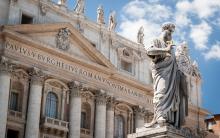
A European financial crimes watchdog on Dec. 15 called on the Vatican to prosecute those caught money laundering, stating the Holy See must act to ensure the success of its financial reforms.
“There is a need now for the anti-money laundering and counter terrorist financing system, to deliver effective results in terms of prosecutions, convictions and confiscation,” said the report by the Council of Europe’s Moneyval oversight agency.
Although the Holy See has adopted new legislation in recent years to tackle money laundering within the city-state, there have been no indictments or prosecutions as a result of the new rules.
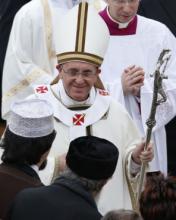
Laying out a blueprint for the issues that are likely to define his papacy, Pope Francis on Tuesday issued a biting critique of capitalism, calling on world leaders to fight against poverty and for the rich to share their wealth, and urging the media to adjust its priorities.
“How can it be that it is not a news item when an elderly homeless person dies of exposure, but it is news when the stock market loses two points?” Francis asked in an 84-page “apostolic exhortation” that is widely seen as a road map for his papacy akin to a presidential State of the Union address.
“How can we continue to stand by when food is thrown away while people are starving?” he asked. “Today, everything comes under the laws of competition and the survival of the fittest, where the powerful feed upon the powerless. As a consequence, masses of people find themselves excluded and marginalized: without possibilities, without any means of escape.”
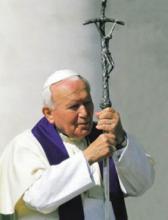
Popes John Paul II and John XXIII will be formally declared saints on April 27, 2014, the Vatican said Monday. Pope Francis made the announcement during a meeting with cardinals gathered in Rome.
John Paul, who was pope from 1978 to 2005, and John, who reigned from 1958 to 1963, are considered two of the most influential religious leaders in the world in the last century, and they represent two poles in Roman Catholicism — John XXIII is a hero to liberals, while John Paul II is widely hailed by conservatives.

Are the media pulling their punches when it comes to Pope Francis?
Whether it’s because he carries his own bags or cold-calls troubled Catholics who write to him, or because he so clearly loves interacting with crowds or drives a beat-up Renault around the Vatican, it’s hard to tell. But at some point, much of the world’s media fell for the new pope.
Now an increasing number of Vatican insiders are asking whether the largely positive view of Francis affects the way the media cover the Holy See.
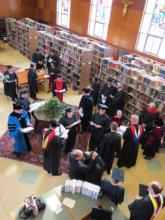
After decades of glum trends — fewer priests, fewer parishes — the Catholic Church in the United States has a new statistic to cheer: More men are now enrolled in graduate-level seminaries, the main pipeline to the priesthood, than in nearly two decades.
This year’s tally of 3,694 graduate theology students represents a 16 percent increase since 1995 and a 10 percent jump since 2005, according to Georgetown University’s Center for Applied Research in the Apostolate (CARA).
Seminary directors cite more encouragement from bishops and parishes, the draw of Pope Emeritus Benedict XVI and the social-justice-minded Pope Francis, and a growing sense that the church is past the corrosive impact of the sexual abuse crisis that exploded in 2002.
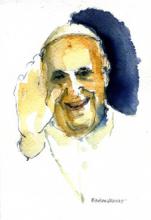
Pope Francis’ comments last week on everything from gays to abortion (less talk, more mercy), the hierarchy (be pastors, not bureaucrats), and religious faith (doubt is part of belief) continue to reverberate through the church and the media.
Here are five broader insights that this wide-ranging interview revealed about Francis — and why they will be keys to reading his pontificate, and perhaps the future of Catholicism.
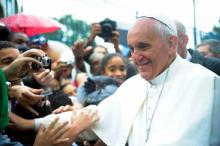
Wading into ongoing debates over religion and politics, Pope Francis on Sunday gently chided Christians to pray for politicians, saying “a Christian who does not pray for his leaders is not a good Christian.”
The pope’s remarks during a two-hour closed-door meeting of Roman clergy did not touch on more controversial issues like the separation between church and state, abortion, or refusing Communion to Catholic politicians who are not in sync with church teachings.
Instead, Francis quoted St. Paul, who urged prayer “for kings and all who are in high positions, that we may lead a peaceful and quiet life.”
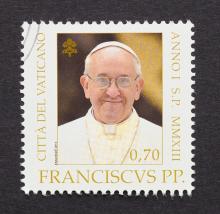
I WAS 15 when Pope Paul VI died in 1978. He’d been pope my whole life. Elated at the election of John Paul, I followed his papacy with all the obsessive focus of a teenager. When he died 33 days later, I simply didn’t know what to think. (His book Illustrissimi, a collection of letters written to saints, novelists, and artists, is one I return to for insight on Catholic imagination.)
During John Paul II’s 27 years as pope (the second longest reign in papal history), a dangerous nostalgia for a pre-Vatican II church was encouraged to flourish.
Under Pope Benedict XVI, that nostalgia came to fruition. The Latin Mass was re-established in many parishes. Amid a worldwide sex abuse scandal, liturgical correctness and “fancy dress” were too often elevated over children’s protection, victims’ needs, and institutional transparency. Women and girls were pushed further off the altar. To be gay, female, divorced, or a single mother—all these pushed one further from the table of the Lord, rather than drawing one nearer.
And now we have Pope Francis. When Jorge Mario Bergoglio announced he would take the name Francis, after Francis of Assisi, I wept. To have the Poverello (the “poor one”) at the center of our Catholic faith is right and just—whether that poor one is a 13th century itinerant preacher or a child in the villas miseria around Buenos Aires.
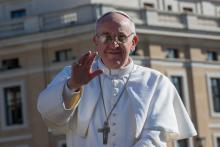
He has been Pope Francis for less than a month, but the keep-it-simple prelate from Argentina is a wow with American Catholics — at least for now.
The tables may turn on Francis once media attention moves from his no-fuss style to his substantive actions, said a Vatican expert Wednesday.
The former archbishop of Buenos Aires has an 84 percent favorable rating among U.S. Catholics, including 43 percent who hold a very favorable view of him, according to a new survey by the Pew Forum on Religion & Public Life.
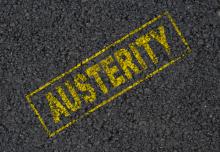
AS THE U.S. Congress and the president repeatedly battle over the debt ceiling and contemplate cuts to Social Security and Medicare, austerity has begun to sound like common sense: "Families tighten their belts during hard times, and so must government."
However, "common sense" in our media age is carefully manufactured, and its underlying analogy doesn't always hold up to scrutiny. "Living within our means," for most families, includes debt financing for housing, cars, and college. Families having a hard time paying their bills may indeed tighten their belts—but they seek more income first, and cut care for children and the sick last. In contrast, federal budget austerity arguments always focus on spending, ignoring the revenue crisis born of decades of tax cuts.
Christians have a more profound reason to question "austerity measures": They conflict with our faith in God's abundance. In parable after parable—the prodigal son, the unforgiving debtor, Lazarus and the rich man—Jesus challenges us to emulate God's generosity. It is the theme of that most eucharistic miracle, the loaves and fishes. How to live in the light of God's abundance is never an easy question, but we must be open to its logic in every area of human existence, including our personal lives, our economy, and our government.
There is, needless to say, a deep contrast between Christian notions of abundance, rooted in God's boundless creative gift, and the modern field of economics, which bases itself on the principle that commodities are scarce. Yet there are also resonances between abundance and modern macroeconomics (the study of whole economies) as it developed in the New Deal period and the first three decades after World War II—especially in the great postwar era of shared prosperity, which saw an explosive expansion of the middle class.
During that period, everyone gave to the national common good, and everyone received—not just through strongly redistributive taxation, but through shared, unprecedented economic growth. And it wasn't simply the "invisible hand" of the marketplace that guided growth: The market was fostered by government's investment in infrastructure and education.
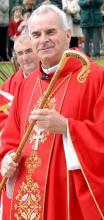
Days after pulling out of the conclave to elect the next pope and vowing to fight the charges against him, disgraced Scottish Cardinal Keith O’Brien admitted Sunday to inappropriate “sexual conduct.”
O’Brien, who until a week ago was the highest-ranking Roman Catholic cleric in England and Scotland, had served as archbishop of St. Andrews and Edinburgh for the last seven years and was made a cardinal in 2003.
So what makes the Troy Davis case stand out from most other death penalty cases?
Serious doubt.
Not about whether the death penalty is the appropriate punishment for Davis or has been correctly applied.
The doubt raised in Davis' case is whether he committed the crime at all. And those questions about his guilt have prompted hundreds of thousands of people to raise their voices in opposition to his execution, most recently former FBI Director William Sessions who, in an op-ed in the Atlanta Journal-Constitution Friday, called on the Georgia Board of Pardons and Paroles to commute Davis' sentence to life in prison.